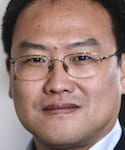Research promises to improve ability of drugs to target tough-to-treat bone cancers
Rice University chemist Han Xiao and biologist Xiang Zhang at Baylor College of Medicine have won a $2.3 million Department of Defense grant to expand their efforts to halt bone cancer metastasis.

Han Xiao

Xiang Zhang
The three-year grant is a Level 2 Breast Cancer Research Program Breakthrough Award, through which the department’s U.S. Army Medical Research and Development Command “challenges the scientific community to design research that will address the urgency of ending breast cancer.”
Xiao and Zhang are targeting bone cancer metastasis by coupling a molecule used to treat osteoporosis, alendronate, with the HER2-targeting antibody trastuzumab used to treat breast cancer. A study released earlier this year showed the antibody conjugate called BonTarg, which relies on Xiao’s pClick technology, significantly enhances the concentration of the antibody at tumor sites.
Experiments showed the treatment could also inhibit secondary metastasis from infected organs seeded by bone tumors. They noted at the time that 20 to 40% of breast cancer survivors eventually suffer metastases to distant organs, with metastasis to bone occurring in about 70% of cases.
Xiao said the previous study applied to tumors related to patients whose breast cancers are related to the overexpression of HER2 protein. The new grant will allow the team to expand their study to a wider patient population.
“The grant will also allow us to improve the therapeutic effect but also to explore the mechanism of our drug,” Xiao said. “Ultimately, we hope this grant will help us push toward a Phase 1 clinical trial.”
Xiao is the Norman Hackerman-Welch Young Investigator, the Cancer Prevention and Research Institute of Texas (CPRIT) Scholar in Cancer Research and an assistant professor of chemistry, bioengineering and biosciences. Zhang is the William T. Butler, M.D., Endowed Chair for Distinguished Faculty, McNair Scholar, associate director of the Lester and Sue Smith Breast Center, professor of molecular and cellular biology and member of the Dan L Duncan Comprehensive Cancer Center.

